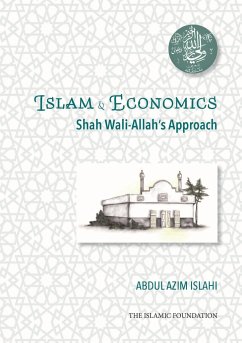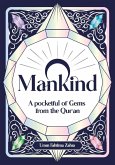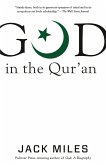16,99 €
inkl. MwSt.
Versandfertig in 2-4 Wochen

8 °P sammeln
- Broschiertes Buch
- Merkliste
- Auf die Merkliste
- Bewerten Bewerten
- Teilen
- Produkt teilen
- Produkterinnerung
- Produkterinnerung
Shah Wali-Allah had a deep understanding of Qurâ an, Hadith and Fiqh. This book is unique as it focussing on Shah Wali-Allahâ s life as well as thought from an economic perspective.
Andere Kunden interessierten sich auch für
![Communicating with Allah Communicating with Allah]() Bassam SaehCommunicating with Allah12,99 €
Bassam SaehCommunicating with Allah12,99 €![Turning Back to Allah Turning Back to Allah]() Aliya VaughanTurning Back to Allah11,99 €
Aliya VaughanTurning Back to Allah11,99 €![O Mankind! O Mankind!]() Umm Fahtima ZahraO Mankind!12,99 €
Umm Fahtima ZahraO Mankind!12,99 €![The Power of Now The Power of Now]() Eckhart TolleThe Power of Now12,63 €
Eckhart TolleThe Power of Now12,63 €![A History of God A History of God]() Karen ArmstrongA History of God16,99 €
Karen ArmstrongA History of God16,99 €![God in the Qur'an God in the Qur'an]() Jack MilesGod in the Qur'an17,99 €
Jack MilesGod in the Qur'an17,99 €![Allah Allah]() Gabriel Said ReynoldsAllah36,99 €
Gabriel Said ReynoldsAllah36,99 €-
-
-
Shah Wali-Allah had a deep understanding of Qurâ an, Hadith and Fiqh. This book is unique as it focussing on Shah Wali-Allahâ s life as well as thought from an economic perspective.
Hinweis: Dieser Artikel kann nur an eine deutsche Lieferadresse ausgeliefert werden.
Hinweis: Dieser Artikel kann nur an eine deutsche Lieferadresse ausgeliefert werden.
Produktdetails
- Produktdetails
- Verlag: Islamic Foundation
- Seitenzahl: 256
- Erscheinungstermin: 1. November 2022
- Englisch
- Abmessung: 213mm x 138mm x 17mm
- Gewicht: 336g
- ISBN-13: 9780860378518
- ISBN-10: 0860378519
- Artikelnr.: 62270791
- Herstellerkennzeichnung
- Libri GmbH
- Europaallee 1
- 36244 Bad Hersfeld
- gpsr@libri.de
- Verlag: Islamic Foundation
- Seitenzahl: 256
- Erscheinungstermin: 1. November 2022
- Englisch
- Abmessung: 213mm x 138mm x 17mm
- Gewicht: 336g
- ISBN-13: 9780860378518
- ISBN-10: 0860378519
- Artikelnr.: 62270791
- Herstellerkennzeichnung
- Libri GmbH
- Europaallee 1
- 36244 Bad Hersfeld
- gpsr@libri.de
Dr. Abdul Azim Islahi is a professor at the Islamic Economics Institute, Jeddah. He has spent more than 30 years in research, teaching and expanding the frontiers of the discipline of Islamic economics, King Abdulaziz University. He obtained his PhD from the Aligarh Muslim University, India in 1981
Introduction by Professor Khurshid Ahmad Preface: 1 Overview of the Muslim Situation during Shah Wali-Allah's Time 1.1 The World and the Muslim situation in 12th century AH/18th century CE 1.2 Important Muslim regions 1.3 Mughals and the emerging Indian Sultanates 1.4 Khanates in Central Asia 1.5 Muslim states in Far East Asia 1.6 The economic front 1.7 Awakening among the Ottomans 1.8 India of Shah Wali-Allah's time 1.9 Medina becomes the foundation for revival and renovation 2 Shah Wali-Allah Dihlawi: Life and Times 2.1 Times and environment 2.2 Life 2.3 Areas of major contributions 2.4 Political role 2.5 His death and resting place 2.6 Impact of Shah Wali-Allah 2.7 Shah Wali-Allah-a parallel to Ibn Taymiyyah 3 Intellectual and Academic Heritage 3.1 Shah Wali-Allah's syllabus-an academic legacy 3.2 Sources of Shah Wali-Allah's thought 3.3 Was Shah Wali-Allah influenced by Ibn Taymiyyah and his student Ibn al-Qayyim? 3.4 Introducing Shah Wali-Allah's works 3.5 The impact of Shah Wali-Allah's ideas-factors that led to the fast and vast spread of his works 4 Economic Ideas of Shah Wali-Allah Dihlawi 4.1 Economic ideas in Shah Wali-Allah's works 4.2 Study of applied economy 4.3 Theoretical economic ideas 4.4 Economic activities in an Islamic framework 4.5 Measures to avoid disputes in economic transactions 4.6 Some major contributions 5 Tadb
r al-Manzil (Household Management) 5.1 Origins of tadb
r al-manzil 5.2 Tadb
r al-manzil in the Islamic tradition 5.3 Shah Wali-Allah on tadb
r al-manzil 5.4 The subject matter of tadb
r al-manzil 5.5 Other areas of tadb
r al-manzil 5.6 The present discipline of economics and the Greek oikonomia 5.7 Market versus 'family' 6 Shah Wali-Allah on Money and Interest 6.1 Money as seen by the Greek philosophers 6.2 Money in the early period of Islam 6.3 Difficulties of the barter system 6.4 Functions of money 6.5 Is it must to use gold and silver as money? 6.6 Interest-an ill-use of money 6.7 Rib
(interest proper) 6.8 Is the charging of interest prohibited from the poor only? 7 Public Finance 7.1 The subject of public finance-first to attract attention 7.2 Public revenue 7.3 Economics of zakah 7.4 Public expenditure 7.5 Public borrowing 7.6 Concern for the poor 8 Shah Wali-Allah on the Stages of Socio-Economic Development 8.1 Early Muslim scholars' holistic approach to development 8.2 Development role of the state 8.3 Ibn Khaldun's cyclical model of development 8.4 Shah Wali-Allah's theory of socio-economic development 8.5 Irtif
q
t: a natural process in human development 9 Conclusion: Comparison and Evaluation Bibliography Arabic References Other Languages Indexes Names Subjects
r al-Manzil (Household Management) 5.1 Origins of tadb
r al-manzil 5.2 Tadb
r al-manzil in the Islamic tradition 5.3 Shah Wali-Allah on tadb
r al-manzil 5.4 The subject matter of tadb
r al-manzil 5.5 Other areas of tadb
r al-manzil 5.6 The present discipline of economics and the Greek oikonomia 5.7 Market versus 'family' 6 Shah Wali-Allah on Money and Interest 6.1 Money as seen by the Greek philosophers 6.2 Money in the early period of Islam 6.3 Difficulties of the barter system 6.4 Functions of money 6.5 Is it must to use gold and silver as money? 6.6 Interest-an ill-use of money 6.7 Rib
(interest proper) 6.8 Is the charging of interest prohibited from the poor only? 7 Public Finance 7.1 The subject of public finance-first to attract attention 7.2 Public revenue 7.3 Economics of zakah 7.4 Public expenditure 7.5 Public borrowing 7.6 Concern for the poor 8 Shah Wali-Allah on the Stages of Socio-Economic Development 8.1 Early Muslim scholars' holistic approach to development 8.2 Development role of the state 8.3 Ibn Khaldun's cyclical model of development 8.4 Shah Wali-Allah's theory of socio-economic development 8.5 Irtif
q
t: a natural process in human development 9 Conclusion: Comparison and Evaluation Bibliography Arabic References Other Languages Indexes Names Subjects
Introduction by Professor Khurshid Ahmad Preface: 1 Overview of the Muslim Situation during Shah Wali-Allah's Time 1.1 The World and the Muslim situation in 12th century AH/18th century CE 1.2 Important Muslim regions 1.3 Mughals and the emerging Indian Sultanates 1.4 Khanates in Central Asia 1.5 Muslim states in Far East Asia 1.6 The economic front 1.7 Awakening among the Ottomans 1.8 India of Shah Wali-Allah's time 1.9 Medina becomes the foundation for revival and renovation 2 Shah Wali-Allah Dihlawi: Life and Times 2.1 Times and environment 2.2 Life 2.3 Areas of major contributions 2.4 Political role 2.5 His death and resting place 2.6 Impact of Shah Wali-Allah 2.7 Shah Wali-Allah-a parallel to Ibn Taymiyyah 3 Intellectual and Academic Heritage 3.1 Shah Wali-Allah's syllabus-an academic legacy 3.2 Sources of Shah Wali-Allah's thought 3.3 Was Shah Wali-Allah influenced by Ibn Taymiyyah and his student Ibn al-Qayyim? 3.4 Introducing Shah Wali-Allah's works 3.5 The impact of Shah Wali-Allah's ideas-factors that led to the fast and vast spread of his works 4 Economic Ideas of Shah Wali-Allah Dihlawi 4.1 Economic ideas in Shah Wali-Allah's works 4.2 Study of applied economy 4.3 Theoretical economic ideas 4.4 Economic activities in an Islamic framework 4.5 Measures to avoid disputes in economic transactions 4.6 Some major contributions 5 Tadb
r al-Manzil (Household Management) 5.1 Origins of tadb
r al-manzil 5.2 Tadb
r al-manzil in the Islamic tradition 5.3 Shah Wali-Allah on tadb
r al-manzil 5.4 The subject matter of tadb
r al-manzil 5.5 Other areas of tadb
r al-manzil 5.6 The present discipline of economics and the Greek oikonomia 5.7 Market versus 'family' 6 Shah Wali-Allah on Money and Interest 6.1 Money as seen by the Greek philosophers 6.2 Money in the early period of Islam 6.3 Difficulties of the barter system 6.4 Functions of money 6.5 Is it must to use gold and silver as money? 6.6 Interest-an ill-use of money 6.7 Rib
(interest proper) 6.8 Is the charging of interest prohibited from the poor only? 7 Public Finance 7.1 The subject of public finance-first to attract attention 7.2 Public revenue 7.3 Economics of zakah 7.4 Public expenditure 7.5 Public borrowing 7.6 Concern for the poor 8 Shah Wali-Allah on the Stages of Socio-Economic Development 8.1 Early Muslim scholars' holistic approach to development 8.2 Development role of the state 8.3 Ibn Khaldun's cyclical model of development 8.4 Shah Wali-Allah's theory of socio-economic development 8.5 Irtif
q
t: a natural process in human development 9 Conclusion: Comparison and Evaluation Bibliography Arabic References Other Languages Indexes Names Subjects
r al-Manzil (Household Management) 5.1 Origins of tadb
r al-manzil 5.2 Tadb
r al-manzil in the Islamic tradition 5.3 Shah Wali-Allah on tadb
r al-manzil 5.4 The subject matter of tadb
r al-manzil 5.5 Other areas of tadb
r al-manzil 5.6 The present discipline of economics and the Greek oikonomia 5.7 Market versus 'family' 6 Shah Wali-Allah on Money and Interest 6.1 Money as seen by the Greek philosophers 6.2 Money in the early period of Islam 6.3 Difficulties of the barter system 6.4 Functions of money 6.5 Is it must to use gold and silver as money? 6.6 Interest-an ill-use of money 6.7 Rib
(interest proper) 6.8 Is the charging of interest prohibited from the poor only? 7 Public Finance 7.1 The subject of public finance-first to attract attention 7.2 Public revenue 7.3 Economics of zakah 7.4 Public expenditure 7.5 Public borrowing 7.6 Concern for the poor 8 Shah Wali-Allah on the Stages of Socio-Economic Development 8.1 Early Muslim scholars' holistic approach to development 8.2 Development role of the state 8.3 Ibn Khaldun's cyclical model of development 8.4 Shah Wali-Allah's theory of socio-economic development 8.5 Irtif
q
t: a natural process in human development 9 Conclusion: Comparison and Evaluation Bibliography Arabic References Other Languages Indexes Names Subjects







